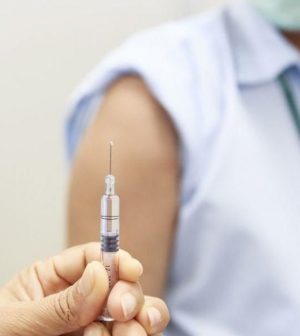- Understanding the Connection Between Anxiety and Depression
- How Daily Prunes Can Influence Cholesterol and Inflammation
- When to Take B12 for Better Absorption and Energy
- Epsom Salts: Health Benefits and Uses
- See What Saffron Can Do for Sleep and Heart Health
- 6 Common Mistakes to Avoid Before Your Physical
- Can Sweating Really Help You Beat a Cold?
- Strengthening Your Relationship: Practical Strategies
- Skip Storing This Everyday Product in the Fridge Door
- Green Tea + B3 Pairing May Boost Brain Health
U.S. to Recommend Booster Shots for Most Americans

The Biden administration plans to recommend that most Americans get a booster shot eight months after they received their second dose of either the Pfizer or Moderna COVID-19 vaccines, as the highly infectious Delta variant marches across the country.
Officials could announce the decision as early as this week, with third shots becoming available to those most vulnerable as early as mid-September, The New York Times reported.
People who chose the single-dose Johnson & Johnson vaccine will likely also need a booster shot, but officials are waiting for the results of the company’s two-dose clinical trial that are expected later this month.
The first boosters will be given to nursing home residents, health care workers and emergency workers. Next up would be older people who were near the front of the line when vaccinations began late last year, followed by the general population. The plan is to give people the same vaccine they first received, the Times reported.
What has U.S. health officials worried? Data from Israel continues to suggest that the Pfizer vaccine’s protection against severe disease has fallen significantly for elderly people who got their second shot in January or February, the Times reported.
The latest data, posted on the Israeli government’s website on Monday, shows a continued erosion in the potency of the Pfizer vaccine against mild or asymptomatic infections in general and against severe disease among seniors who were vaccinated early in the year.
One slide suggested that for those 65 years or older who got their second shots in January, the vaccine is now only about 55 percent effective against severe disease. But researchers noted the data has a wide margin of error, and some said other Israeli government data suggested the decline in efficacy was less severe, the Times reported.
“It shows a pretty steep decline in effectiveness against infection, but it’s still a bit murky about protection against severe disease,” said Dr. Peter Hotez, a vaccine expert at the Baylor College of Medicine in Houston who reviewed the data, told the Times.
Dr. Jesse Goodman, a former chief scientist with the U.S. Food and Drug Administration, said the data shows “worrisome trends” that hint at waning efficacy. But he told the Times that he would like to see more detail from Israel and data indicating whether the United States is headed down the same road.
Federal officials said the U.S. booster program will almost certainly follow the same scenario as the initial vaccination program, the Times said. The first shots for the general public in the United States were administered on Dec. 14, days after the FDA. authorized the Pfizer shot for emergency use. People started receiving the Moderna vaccine a week later.
The regulatory path for additional shots is not entirely clear. Pfizer filed data to the FDA on Monday that it said showed the safety and effectiveness of a booster shot, but the data was preliminary. Moderna is also exploring the safety and efficacy of both a half-dose and a full dose as a third shot.
About 60% of the U.S. population has gotten at least one dose and nearly 51% are fully vaccinated, according to the U.S. Centers for Disease Control and Prevention. That, in turn, has caused a shortage of intensive care unit beds, nurses and other front-line staff in areas that can no longer keep up with the flood of unvaccinated patients.
“That’s heartbreaking, considering we never thought we would be back in that space again,” Collins said on Fox News Sunday. “But here we are with the Delta variant, which is so contagious, and this heartbreaking situation where 90 million people are still unvaccinated who are sitting ducks for this virus, and that’s the mess we’re in. We’re in a world of hurt.”
In the meantime, the World Health Organization — citing a lack of global supply of vaccines — has objected to richer nations moving ahead with booster shots when citizens of many poorer countries have yet to receive even a first dose of vaccine.
FDA OKs Third COVID Shot for Most Vulnerable Americans
The U.S. Food and Drug Administration last week authorized a third “booster” shot of coronavirus vaccines for people with weakened immune systems, as the highly contagious Delta variant continues to surge across the country.
Expanding the emergency use of the Pfizer and Moderna vaccines should help protect those patients who are considered most vulnerable to COVID-19 infection. The authorization includes people who have had solid organ transplants and those whose immune systems are equally compromised, the FDA said.
The Johnson & Johnson vaccine wasn’t included in the authorization because there isn’t sufficient data yet on that vaccine, according to the agency.
With the booster dose approved, doctors will now have the leeway to give additional shots to vulnerable patients. About 3 percent of Americans have weakened immune systems for numerous reasons, from a history of cancer to the use of certain medications such as steroids.
“”The country has entered yet another wave of the COVID-19 pandemic, and the FDA is especially cognizant that immunocompromised people are particularly at risk for severe disease,” Acting Commissioner Dr. Janet Woodcock said in a statement. “After a thorough review of the available data, the FDA determined that this small, vulnerable group may benefit from a third dose of the Pfizer-BioNTech or Moderna vaccines.”
“Other individuals who are fully vaccinated are adequately protected and do not need an additional dose of COVID-19 vaccine at this time,” Woodcock added, while noting that the agency was “actively engaged in a science-based, rigorous process with our federal partners to consider whether an additional dose may be needed in the future.”
Despite the authorization, many scientists argue that the immunocompromised population is too diverse to uniformly recommend additional shots of coronavirus vaccine, the Times reported.
Studies do suggest that patients such as organ transplant recipients often show little immune response to the standard vaccine dosing schedule, and so they could benefit from a third jab. One recent study by Canadian researchers found that a third dose of the Moderna vaccine improved the immune response of people in that group, the Times reported.
Dr. Dorry Segev, from Johns Hopkins’ Bloomberg School of Public Health in Baltimore, has said about half of transplant patients have no antibody response to the currently authorized vaccine dosage, the Times reported. His team studied 30 transplant patients who were vaccinated but had negative or low-positive antibody [blood] titers, which pointed to a poor response by their immune systems to the shots. After an additional shot, 14 of them had higher antibody titers.
Although the vast majority of Americans who have been vaccinated got Pfizer or Moderna shots, it is not yet clear how those with immune deficiencies who received Johnson & Johnson shots are to proceed, the Times said.
Dr. Dan Barouch, a virologist at Beth Israel Deaconess Medical Center in Boston who worked with Johnson & Johnson as it developed its vaccine, said the FDA’s move to make third shots available to some with weakened immune systems made sense.
More information
The U.S. Centers for Disease Control and Prevention has more on COVID-19.
SOURCES: Associated Press; The New York Times
Source: HealthDay
Copyright © 2026 HealthDay. All rights reserved.










